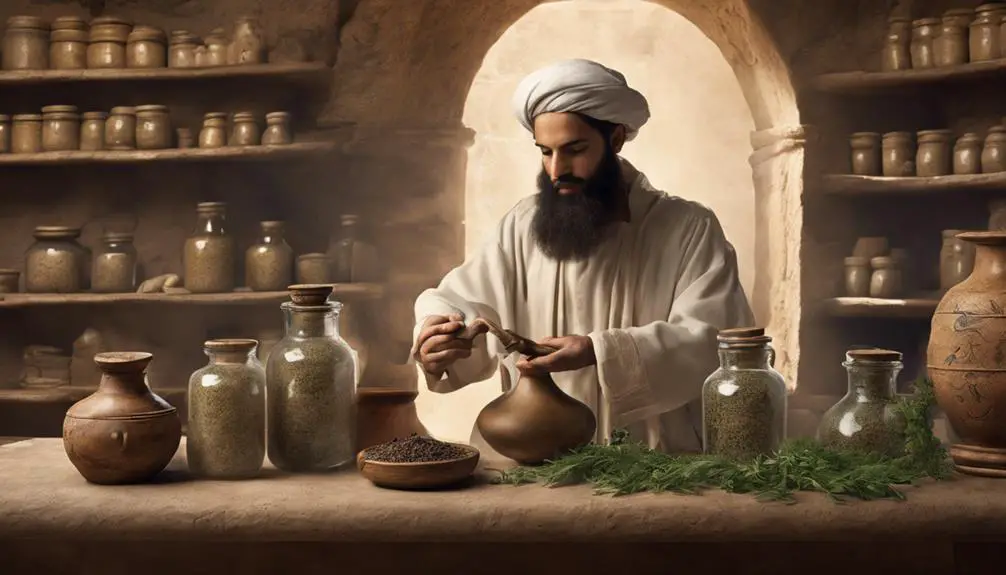Intriguing insights into the biblical role of apothecaries reveal a blend of spirituality and healing, prompting a deeper exploration.

Apothecary Definition in the Bible
Exploring the definition of an apothecary in the Bible is like unearthing a time capsule, offering a glimpse into the past with insights that remain relevant today. You'll find that apothecaries played a crucial role, not just in health and medicine, but in the spiritual and cultural fabric of biblical times.
Their responsibilities and the significance of their work are woven intricately into the scriptures, providing a fascinating intersection of faith, tradition, and the art of healing. Unpacking this topic further opens up a discussion on how these ancient practices influence our understanding of wellness, community, and spirituality in a contemporary context.
Key Takeaways
- Apothecaries in biblical times were esteemed for their healing and pharmacological knowledge.
- Their role included preparing remedies and contributing to spiritual healing practices.
- Biblical references require contextual analysis to accurately understand the apothecaries' significance.
- They bridged the gap between the divine and humanity through their medicinal and spiritual practices.
Historical Context of Apothecaries

In exploring the historical context of apothecaries, it's crucial to recognize their pivotal role in ancient societies as both healers and early pharmacists. Their expertise wasn't simply confined to local communities but extended through intricate trade practices and herbal sourcing, which were foundational to their profession. You'll find that these individuals weren't just confined to mixing remedies; they were deeply involved in the procurement and understanding of herbs from various regions.
The trade practices of apothecaries involved a complex network that spanned continents. They'd to be knowledgeable about where to source the best quality herbs and how these herbs could be transported without losing potency. This required a deep understanding of preservation techniques and the logistics of trade routes that were often fraught with challenges.
Herbal sourcing was another critical aspect of their work. Apothecaries had to distinguish between numerous varieties of plants, roots, and minerals, understanding their properties and potential interactions. This knowledge was essential not only for the creation of effective remedies but also to ensure that these concoctions did no harm. They relied on an extensive botanical knowledge, much of which was passed down through generations or acquired through trade with distant lands.
Biblical References Explained
Turning to biblical texts, you'll find that references to apothecaries and their practices shed light on the esteemed position they held within ancient societies. These mentions aren't only indicative of the roles apothecaries played but also highlight the complexities involved in translating and interpreting ancient texts. Here are some key points to consider:
- Translation challenges: The original Hebrew and Greek texts use specific terms for apothecaries that have nuanced meanings, making accurate translation challenging. These challenges affect our understanding of the apothecary's role in biblical times.
- Interpretation variations: Different biblical scholars may interpret the same text in varying ways, leading to diverse understandings of what apothecaries did and symbolized in biblical contexts.
- Contextual analysis: Understanding the context in which these references were made is crucial for an accurate interpretation, requiring a deep dive into historical, cultural, and societal norms of the time.
- Cross-referencing: Comparing these biblical references with contemporary accounts from other sources can provide a more rounded picture of apothecaries' roles and the significance of their mention in biblical texts.
Roles and Responsibilities

Delving into the roles and responsibilities of apothecaries in biblical times reveals their critical contributions to health and medicine within ancient communities. You'll find that their work wasn't just about mixing potions or remedies; it was deeply rooted in the herbal traditions and medicinal knowledge of their era. Apothecaries played a pivotal role in gathering, preparing, and distributing medicines derived from the natural world around them. Their expertise in the properties of herbs, plants, and minerals was unparalleled, making them the primary healthcare providers in their communities.
Here is a visual representation of their roles and responsibilities:
Role |
Responsibility |
|---|---|
Gatherer |
Collected herbs and plants with medicinal properties |
Researcher |
Studied and documented the effects of various substances |
Healer |
Prepared and administered remedies for health issues |
Educator |
Passed on medicinal knowledge and herbal traditions |
Innovator |
Developed new methods for treatment and medicine preparation |
Their work required a deep understanding of the natural world, an analytical mind to decipher the complexities of herbal traditions, and a compassionate heart to care for those in need. Through their efforts, apothecaries laid the groundwork for modern pharmacology and medicine.
Spiritual Significance
While examining the roles of apothecaries in biblical times, it's crucial to also explore their spiritual significance, as they were often perceived as intermediaries between the physical and divine realms. This perception stems from their involvement in healing rituals and their role in invoking divine intervention. Their practices weren't just about the physical healing of ailments but also carried a deeper, spiritual dimension that resonated with the beliefs and values of the time.
The spiritual significance of apothecaries in the Bible can be summarized through the following points:
- Intermediaries of Faith: They bridged the gap between humanity and the divine, employing their knowledge to invoke God's favor.
- Practitioners of Healing Rituals: Their preparations were often part of larger rituals seeking divine intervention for healing.
- Custodians of Sacred Knowledge: They possessed knowledge of sacred herbs and substances, intertwining their work with spiritual practices.
- Agents of Divine Will: In their role, they were seen as executing the will of God through their healing practices, making their work an act of faith and devotion.
In this light, apothecaries held a pivotal role not just in the physical well-being of individuals but also in the spiritual fabric of society, embodying the intertwined nature of faith and healing.
Cultural Impact in Biblical Times

In biblical times, apothecaries significantly shaped cultural practices and beliefs through their medicinal and spiritual contributions. Their role was central, not just in healing but in the daily lives of people, intertwining with various aspects of society. Their knowledge of herbal lore was vast, making them indispensable for their understanding of natural remedies. This expertise wasn't merely for healing physical ailments but was deeply woven into the spiritual fabric of the community, affecting rituals and religious ceremonies.
The trade practices of apothecaries also played a crucial role in the economy and the spread of cultural ideas. They were at the heart of ancient commerce, exchanging goods and knowledge across vast networks that spanned continents. Through their trade, apothecaries facilitated not just the dissemination of medicinal substances but also the flow of herbal lore across different cultures. This exchange contributed to a rich tapestry of cultural understanding and mutual respect among diverse peoples.
In essence, the apothecaries' influence extended beyond their immediate medicinal contributions. They were custodians of knowledge that shaped not only health practices but also the cultural and spiritual landscape of biblical times. Their impact is a testament to the intertwined nature of science, religion, and culture in the ancient world.
Frequently Asked Questions
How Do Modern Pharmaceutical Practices Compare and Contrast With Ancient Apothecary Practices Mentioned in the Bible?
When comparing modern pharmaceutical practices to ancient apothecary methods, you'll notice stark differences in drug formulation and herbal sourcing. Today, you've got precise, scientifically tested formulations developed in sterile labs.
Back then, it was about mixing herbs and natural substances with knowledge passed down through generations. While modern practices focus on purity and dosage accuracy, ancient methods were more about the holistic approach, blending spiritual, medicinal, and practical knowledge.
Are There Any Specific Biblical Prohibitions or Endorsements Regarding the Use of Apothecaries or Their Concoctions?
Diving into ancient texts without a map, you'd be hard-pressed to find specific injunctions against or endorsements for apothecaries and their brews. The Bible, rich in herbal symbolism and sacrificial ingredients, doesn't directly address modern apothecary practices.
Analytically speaking, while it imbues certain plants and substances with spiritual significance, it stops short of explicitly approving or disapproving of the apothecary's craft as understood today.
How Have Interpretations of Biblical References to Apothecaries Influenced Contemporary Christian Views on Medicine and Healing?
You're exploring how biblical references have shaped modern Christian perspectives on medicine. These interpretations often merge spiritual pharmacology with faith-based remedies, reflecting a nuanced approach to healing that integrates both spiritual and physical aspects.
This blend influences contemporary views, encouraging a holistic approach to wellness. It underscores the importance of faith in the healing process, while still recognizing the value of conventional medicine, demonstrating a complex interplay between belief and healthcare practices.
Can We Find Any Parallels Between the Apothecary's Role in the Bible and the Roles of Healers or Medicine Men in Other Ancient Cultures?
Yes, you can find parallels between the roles of healers in various ancient cultures and the biblical apothecary. These roles often centered around herbal traditions and cultural rituals for healing. Like the biblical apothecary, healers and medicine men in other societies used natural remedies and had profound knowledge of plants, underscoring a universal aspect of ancient healing practices.
Their roles were integral to their communities, blending physical healing with spiritual practices.
What Are the Ethical Considerations Surrounding the Use of Apothecaries in Biblical Times, Especially in the Context of Faith Healing Versus Traditional Medicine?
You're delving into a complex landscape where healing miracles and spiritual practices intertwine. Ethically, this blend raises questions.
The use of apothecaries, with their roots deeply entangled in both faith healing and traditional medicine, invites scrutiny. It's a balancing act between embracing spiritual beliefs and ensuring access to empirical, traditional healing methods.
Analyzing this dynamic requires a nuanced understanding of the ethical implications of relying on divine intervention versus established medical practices.
Conclusion
In the tapestry of biblical narratives, apothecaries emerge not merely as ancient pharmacists but as pivotal figures intertwining the physical with the spiritual. Through their roles, you glimpse a world where healing balms and sacred oils blend into a metaphor for divine intervention and human resilience.
Their hands, crafting remedies from the earth's bounty, symbolize a profound connection between humanity and the divine, echoing the broader cultural and spiritual ethos of their times. Their legacy, thus, transcends mere historical footnotes, offering insights into the holistic approach to life and faith in biblical times.



Sign up